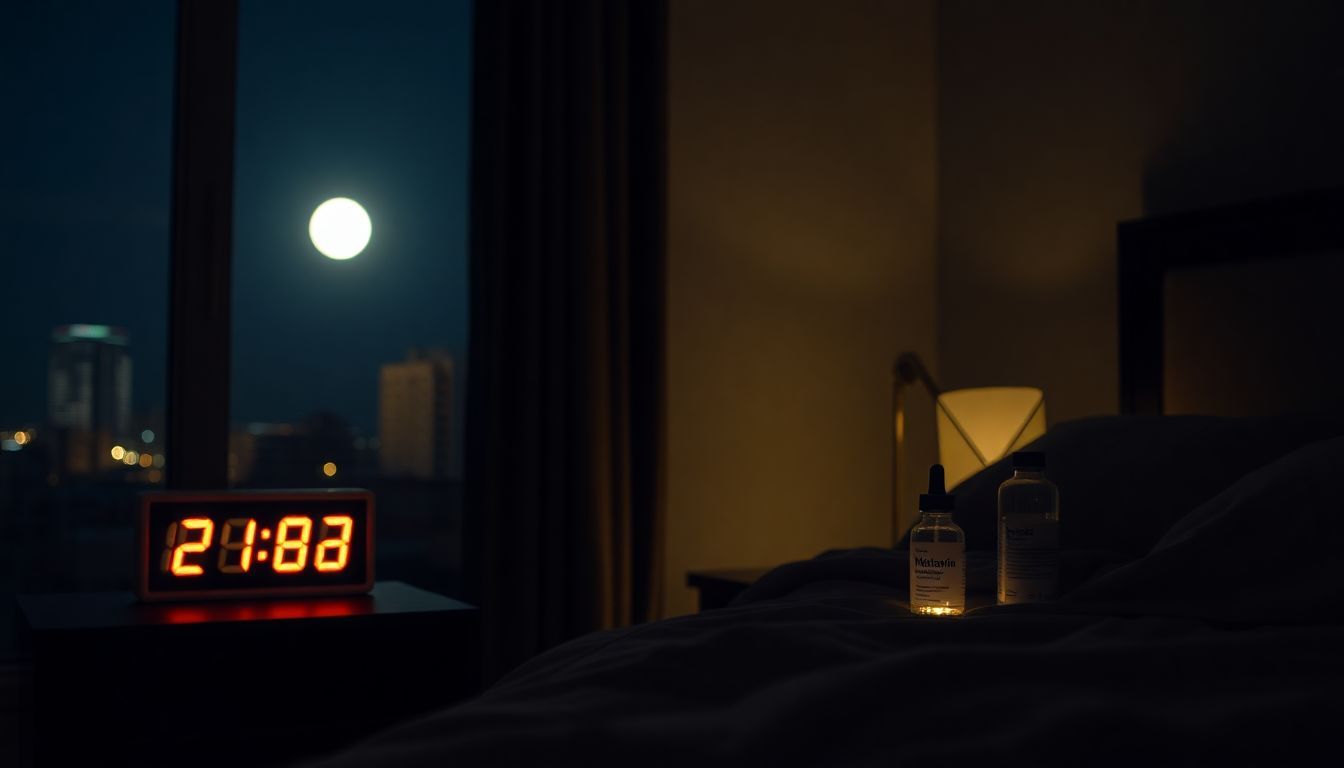Struggling to get a good night’s sleep? Millions of people turn to melatonin supplements for help. This blog will explore how melatonin works, its benefits, and if it can truly fix your sleep problems.
Thank you for reading this post, don't forget to subscribe!Keep reading—you might find the answers you need!
Key Takeaways
- Melatonin is a natural hormone that regulates sleep-wake cycles. Its production increases at night and decreases with light exposure.
- It helps with jet lag, shift work sleep disorders, and mild insomnia by resetting circadian rhythms. A common effective dose for adults ranges from 1 to 5 mg per night.
- Long-term safety in children and teens is unclear. Accidental overdoses are rising, so parents must consult doctors before using melatonin supplements for kids.
- Side effects include drowsiness, headaches, dizziness, or nausea but are usually mild with short-term use. Overuse may cause dependency or disrupt the body’s natural rhythm over time.
- Synthetic melatonin is safer than animal-derived options due to fewer contaminants and consistent quality control processes. Always read labels and seek advice for proper dosage.
What is Melatonin?
Melatonin is a natural hormone made by the pineal gland in your brain. This pea-shaped gland sits just above the middle of your brain. Melatonin helps regulate your sleep-wake cycle, often called your circadian rhythm.
Your body produces more melatonin when it’s dark and less when it’s light. This explains why you feel sleepy at night and wake up during the day. Production decreases with age, meaning older adults have lower levels than children, who produce the most melatonin naturally.
Besides promoting sleep, melatonin has antioxidant properties that may support immune health.
Common Uses of Melatonin in Sleep Management
Melatonin plays a big role in fixing sleep problems linked to changes in routine or schedule. It helps people deal with disruptions, making it easier to get restful sleep.
Managing jet lag
Jet lag can make trips across multiple time zones exhausting. Using melatonin may help your body adjust faster to new time zones and improve sleep quality.
- Crossing five or more time zones often disrupts your internal clock, leading to sleep disturbances. A review of ten trials shows melatonin reduces these effects effectively.
- Flights heading eastward usually cause more severe jet lag than westward flights. Studies reveal melatonin works better for this direction of travel.
- Effective doses for managing jet lag range from 0.5 mg to 5 mg of melatonin taken before bedtime at your destination.
- The number needed to treat (NNT) is only two, showing how effective this supplement can be after crossing several time zones.
- Melatonin helps reset circadian rhythms by aligning your body’s day-night cycle with the local schedule, easing adjustments post-travel.
- Taking it 20–30 minutes before sleep improves total sleep duration and reduces nighttime awakenings that come with jet lag fatigue.
- Avoid using electronic devices before taking melatonin since blue light interferes with its production in the body naturally.
- Keep regular sleeping hours at your destination while using melatonin supplements to maximize results and regulate your sleep-wake cycle faster.
Treating shift work sleep disorders
Shift work sleep disorder affects people who work irregular hours, like night shifts. Melatonin can help reset their circadian rhythms and improve sleep quality.
- Small doses of melatonin may aid shift workers in falling asleep during the day when they’re off duty.
- This supplement helps regulate the disrupted sleep-wake cycle caused by irregular work hours.
- Chronic sleep deprivation from shift work increases risks of diabetes, heart disease, and other health issues over time.
- Employers can support better rest by encouraging workers to use melatonin supplements responsibly as part of a broader sleep hygiene plan.
- Doctors might recommend proper doses and timing based on individual needs to maximize its effects safely.
General sleep aid for insomnia
Melatonin is often used to help with chronic insomnia. It helps regulate the body’s sleep-wake cycle, making it easier to drift off. Around 3 million Americans were using melatonin aids by 2012, showing its growing popularity as a sleep aid.
A common dosage ranges from 1 to 3 milligrams taken about two hours before bed.
This supplement can shorten the time it takes to fall asleep and improve overall sleep quality. Studies suggest melatonin may reduce nighttime awakenings, providing deeper rest for users struggling with insomnia disorder or poor circadian rhythms.
It’s considered safe for short-term use, typically one to two months at a stretch without major adverse effects reported in most cases.

Melatonin Dosage Guidelines
Finding the right melatonin dose depends on age, health, and sleep troubles. Read on to learn safe options for better rest!
Recommended dosages for adults
Adults should start with a low dose of melatonin, around 1 milligram or less. This helps the body adjust and minimizes potential side effects. If needed, increase gradually to find what works best for you.
Typical doses range from 1 to 5 milligrams per night and are effective for most sleep issues like chronic insomnia or jet lag prevention. Taking more than 3 milligrams rarely improves results but may lead to headaches or daytime sleepiness.
Do not exceed the maximum recommended dose of 10 milligrams in any 24-hour period.
Adjustments for children and the elderly
Children need smaller doses of melatonin compared to adults. Infants can take 1 mg, while older children may use 2.5–3 mg. Adolescents might require up to 5 mg for sleep issues like delayed sleep phase or trouble falling asleep.
High doses are not safe for kids, as long-term effects remain unclear.
Elderly people often have lower natural melatonin levels due to aging. For them, prolonged-release melatonin works best as a first-line treatment for insomnia or circadian rhythm problems.
It helps with both falling and staying asleep without heavy side effects common in other sleep medications like benzodiazepines or prescription drugs like Halcion.
Next: The Science Behind Melatonin and Sleep…

The Science Behind Melatonin and Sleep
Melatonin works with your body’s circadian clock to manage your sleep-wake cycle—read on to understand how it influences deeper and lighter stages of sleep.
How melatonin regulates sleep-wake cycles
The suprachiasmatic nucleus (SCN) in the brain acts as a central clock. It controls melatonin production based on light exposure. When it’s dark, the body increases melatonin levels, signaling that it’s time to sleep.
During daylight, melatonin levels drop and help you stay awake.
This hormone adjusts the sleep-wake cycle by balancing signals for alertness and rest. For people with disrupted circadian rhythms—like shift workers or travelers experiencing jet lag—melatonin supplements may help reset their internal clocks.
Peaks typically occur at night, supporting deeper rest during normal sleeping hours.
The impact of melatonin on REM and non-REM sleep
Melatonin shifts the balance between REM and non-REM sleep. It boosts sleep by increasing levels at night, guiding your body into deeper rest phases. This hormone helps regulate both cycles, improving overall sleep quality.
People with insomnia or shift work disorder may notice fewer nighttime awakenings after using melatonin supplements. Research shows it can also enhance post-traumatic brain injury recovery by stabilizing REM and non-REM patterns.
Combining melatonin with magnesium and vitamin B complex has shown promise in reducing insomnia symptoms while supporting healthy REM functions.
Benefits of Melatonin for Sleep
Melatonin can help you fall asleep faster and stay asleep longer—learn how this supplement might improve your nights.
Shortens time to fall asleep
Taking melatonin supplements can help you fall asleep faster. Studies show it’s particularly effective for people with delayed sleep-wake phase disorder (DSWPD). Instead of tossing and turning, your body gets a clearer signal to wind down.
In children, melatonin reduces the time needed to fall asleep by a significant margin. This makes it useful for families dealing with bedtime struggles. It helps regulate the sleep-wake cycle, giving their natural rhythm a boost.
Improves sleep quality
Falling asleep faster often leads to deeper, more restful sleep. Melatonin helps improve sleep quality by regulating the body’s circadian rhythm. This hormone promotes a natural balance between REM and non-REM cycles, essential for restorative rest.
For people with conditions like ADHD or autism spectrum disorder (ASD), melatonin supplements can enhance overall sleep patterns. Studies show improved total sleep time and fewer disturbances during the night in children with these conditions.
Travelers dealing with jet lag also report better post-travel rest after using melatonin supplements.
Reduces nighttime awakenings
Improved sleep quality often leads to fewer nighttime disruptions. Melatonin helps regulate the circadian rhythm, keeping your body aligned with natural sleep-wake cycles. This reduces those sudden wake-ups that leave you tired in the morning.
Consistent use of melatonin supplements can also support longer periods of deep, restful sleep. Fewer awakenings mean better REM and non-REM sleep stages—essential for feeling refreshed.
For people with insomnia or shift work disorders, this benefit makes a big difference in overall restfulness.

Potential Side Effects and Safety Concerns
Melatonin can cause mild effects like drowsiness or dizziness in some people. Long-term use and interactions with medications may raise safety concerns—consult a doctor before starting.
Common side effects
Some people may experience side effects from melatonin supplements. These effects are usually mild and go away on their own.
- Drowsiness might occur, making it harder to stay alert during the day.
- Headaches can develop, often mild but noticeable.
- Dizziness may happen, causing a lightheaded or unsteady feeling.
- Nausea can be a problem for some users after taking it.
- Irritability might increase, leading to mood changes in certain individuals.
- Nightmares or vivid dreams could happen due to changes in REM sleep cycles.
- Mild anxiety has been reported in rare cases of long-term use.
Most people tolerate this supplement well with short-term use, as less than 2% stop due to adverse reactions. While generally safe, monitor how your body reacts to avoid discomfort or risks like daytime sleepiness interfering with tasks such as driving or working safely!
Long-term use implications
Long-term use of melatonin raises some concerns, especially for children and teens. Studies suggest it might affect pubertal development, though the evidence is not yet clear. Non-serious side effects are more common with extended use, showing a 1.56 times higher risk compared to those who don’t take it.
The long-term safety in managing chronic insomnia isn’t fully understood either, particularly for younger users. While short-term benefits may help sleep issues, experts urge caution before using melatonin regularly over months or years.
This brings up important considerations for specific groups like kids or older adults….
Interactions with other medications
Melatonin can interact with several medications. Taking it with anticoagulants may increase the risk of bleeding. This is especially important for those using blood thinners like warfarin.
Diabetes patients should be cautious, as melatonin may affect blood sugar levels and how diabetes medicines work.
Combining melatonin with CNS depressants, such as sleep aids or alcohol, can cause too much drowsiness. Anticonvulsant users might notice reduced drug effectiveness when taking melatonin regularly.
Always talk to a doctor before mixing supplements or drugs, even over-the-counter ones.
Melatonin for Specific Populations
Different groups may need special care when using melatonin. Factors like age, health conditions, or pregnancy can affect its safety and effectiveness.
Pediatric use and considerations
Melatonin is widely used by children. In 2012, it became the second most common non-vitamin supplement for kids aged 4-17. Pediatricians sometimes suggest melatonin because there are no FDA-approved sleep medications for children under 18.
This makes it a popular choice to help manage insomnia or other sleep disorders.
Accidental overdoses in kids have been increasing. Parents must be cautious with dosages and storage of these supplements. Long-term safety studies on melatonin use in children are scarce.
Consulting with a doctor is key before giving any melatonin product to kids, especially since side effects like drowsiness or mood changes may occur.
Elderly considerations
As people age, their natural melatonin levels drop. This change can make it harder for older adults to fall asleep and stay asleep. The American Academy of Sleep Medicine suggests melatonin may be helpful for addressing these sleep problems in the elderly.
Prolonged-release melatonin works well as a first-choice sleep aid for seniors. It supports better control over circadian rhythms and improves overall sleep quality. Studies also show it could benefit those with Parkinson’s disease-related sleep disorders by promoting deeper rest without harsh side effects seen in other medications like triazolam or quazepam.
Use during pregnancy and breastfeeding
About 4% of pregnant women use melatonin supplements. Concerns arise from animal studies showing possible effects on development. Yet, existing human research suggests no significant risks during pregnancy or breastfeeding.
Melatonin naturally helps regulate sleep-wake cycles and ease insomnia. Pregnant women often face difficulty sleeping due to hormonal changes. Still, it’s wise to speak with a doctor before taking any over-the-counter supplements while expecting or nursing—even for a common sleep aid like this one…
Moving forward, let’s explore alternatives to melatonin that might work for you!
Alternatives to Melatonin
Lifestyle changes and other sleep aids can often help improve rest—learn more in this section.
Behavioral and lifestyle changes
Making changes to habits and routines can improve your sleep. Simple adjustments in daily life can lead to better rest without relying on melatonin supplements.
- Go to bed at the same time every night. This helps regulate your sleep-wake cycle and trains your body for consistent rest.
- Avoid caffeine and alcohol close to bedtime. Caffeine affects your ability to fall asleep, while alcohol disrupts sleep quality during the night.
- Limit screen time before bed. The blue light from screens blocks melatonin production, making it harder for you to feel sleepy.
- Create a relaxing bedtime routine like reading or meditating. A calm activity signals your brain that it’s time for rest.
- Exercise regularly, but not too late in the day. Physical activity improves sleep quality, but exercising late may make falling asleep harder.
- Keep your bedroom cool and dark at night. A comfortable environment promotes deeper and more restful sleep.
- Only use your bed for sleep or intimacy—avoid working or watching TV there.
- Avoid large meals before bed—it can interfere with digestion and cause discomfort.
- Expose yourself to sunlight during the day; natural light boosts alertness and keeps your circadian rhythm balanced.
- Address stress with relaxation techniques like yoga or breathing exercises that prepare you mentally for better sleep.
Other supplements and their effectiveness
Amino acids, like glycine, may help improve sleep. Studies show they can enhance sleep quality with a mean difference (MD) of -1.27. Vitamin D also shows promise in boosting restfulness by regulating the sleep-wake cycle.
Research indicates it has an MD of -1.63 for enhancing overall sleep quality.
Magnesium is another helpful option for better rest and reducing nighttime awakenings. Some studies suggest valerian root aids relaxation and promotes restful sleep as well. These supplements offer alternatives to melatonin for those seeking natural methods to improve their nightly routine.

Choosing the Right Melatonin Supplement
Picking the right melatonin supplement can depend on dosage, form, and personal needs—learn how to make an informed choice.
Factors to consider (purity, dosage, form)
Choosing the right melatonin supplement can be confusing. Focus on purity, dosage, and form to make a smart choice.
- Check the label for purity. Find brands that follow FDA standards for dietary supplements. Avoid products with unnecessary fillers or additives.
- Look for the correct dosage. Adults should stick to 1-5 milligrams per serving. For children, doses depend on age: preschoolers (1-2 mg), school-aged kids (1-3 mg), and teens (1-5 mg). Doses above 10 milligrams are not recommended for adults.
- Think about the best form for your needs. Options include melatonin gummies, capsules, tablets, or liquids. Gummies are suitable if you prefer chewable options. Capsules may work better if you want something easy to swallow or mix into routines.
- Verify the source of melatonin. Synthetic options might be more consistent in quality than “natural” products made from animals’ pineal glands.
- Research customer reviews and brand reputation online before buying the product.
- Make sure it’s non-habit forming if used as a sleep aid regularly.
- Always consult a healthcare provider if pregnant, breastfeeding, elderly or giving it to children under supervision due conditions like ADHD or Autism Spectrum Disorder!
Comparing synthetic vs. natural sources
Synthetic and natural melatonin supplements work in different ways. Here’s a breakdown to help you decide which fits your needs better:
| Aspect | Synthetic Melatonin | Natural Melatonin |
|---|---|---|
| Source | Lab-made, chemically identical to natural melatonin in structure. | Derived from the pineal gland of animals, like cows or pigs. |
| Safety | Generally regarded as safe for most users, with consistent quality control. | Risk of contaminants or viruses due to animal sourcing processes. |
| Ethics | Vegan-friendly and cruelty-free since it doesn’t involve animals. | Not suitable for vegetarians or those concerned about animal welfare. |
| Cost | Affordable and widely available in various forms. | Usually more expensive due to limited production sources. |
| Purity | Highly purified during manufacturing, reducing impurities. | May contain traces of biological matter or allergens. |
FAQs
11. FAQs: Clear answers to common questions about melatonin can help you decide if it’s right for your sleep needs—read on!
How long does melatonin take to work?
Melatonin usually starts to work within 30 to 60 minutes. Fast-release melatonin supplements reach their peak in about 45 minutes to an hour. These are ideal if you need quick help falling asleep.
Extended-release options take longer but stay active for up to 10 hours, supporting sleep through the night.
The half-life of melatonin is short—about 20 to 40 minutes. This means your body processes it quickly, which reduces the chance of lingering effects like grogginess. Timing your dose properly is important for best results.
For example, take it an hour before bed when managing insomnia or jet lag symptoms.
Can you develop a dependency on melatonin?
There is a low risk of addiction to melatonin if used as directed. Experts usually recommend taking it for one to four weeks, with a maximum duration of 13 weeks. Prolonged use beyond this period may raise concerns about psychological dependency, though it does not cause physical addiction like some sleep medications.
Using melatonin every night over time might lead to reliance on the supplement to fall asleep. This can make it harder for your body’s natural circadian rhythm and sleep-wake cycle to function properly without help.
To avoid dependency, limit usage and focus on improving sleep hygiene or using alternatives like cognitive behavioral therapy for insomnia (CBT-I).
Is it safe to use every night?
Relying on melatonin every night seems safe for short-term use. The Food and Drug Administration (FDA) considers it a dietary supplement, not a regulated drug. This means long-term effects are less understood.
Regular nightly use might reduce how well it works over time.
Common side effects include headaches, dizziness, nausea, or daytime fatigue. More serious risks may arise if taken along with other medications like SSRIs or sleep medications. It’s crucial to follow proper melatonin dosage guidelines and consult your doctor first—especially for children, the elderly, or during pregnancy.
Conclusion
Melatonin can be a helpful tool for some sleep problems. It works best for jet lag, shift work issues, or adjusting your sleep schedule. While it may not fix severe insomnia or frequent wake-ups, it’s worth trying under the guidance of a doctor.
Focus on good sleep habits too—like keeping a routine and avoiding screens before bed. Sleep health is about balance, not just one solution!
For more insights into how our bodies work, don’t miss our in-depth exploration on Vitiligo: More Than Skin Deep – Causes, Treatments, Myths.